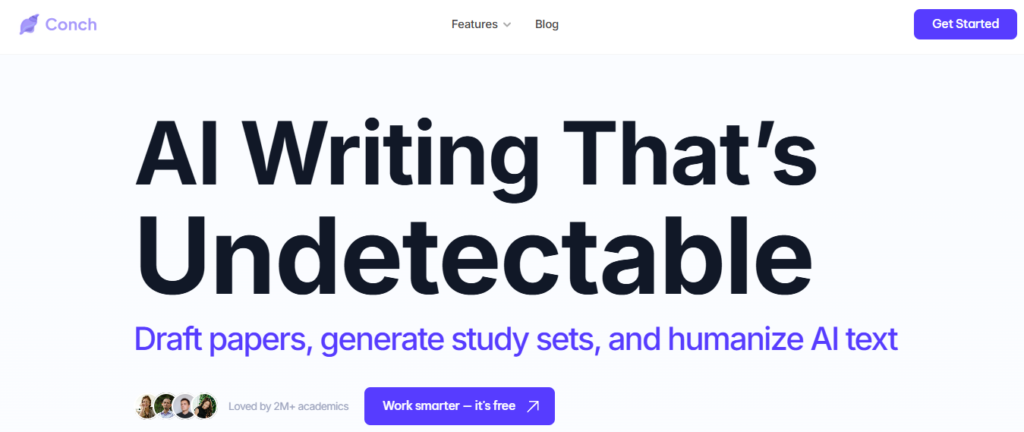Social media has become a part of our daily lives. It’s often a topic of interest for students. Are you one of them? If so, you may have to write a paper on social media sooner or later. For many, writing a paper can be stressful, especially when you have to think of a topic to write about. This is where artificial intelligence can be of assistance.
Knowing how to use AI to write a paper can drastically reduce the stress of writing an essay. First, it can help you find a topic and generate ideas. Then, it can help you write the paper. If you are assigned a social media paper, check out the fresh list of social media argumentative essay topics below. They will get you started in no time.
Conch AI’s AI writing tool can help you get started, develop, and even finish your paper on social media. The AI technology can generate a list of topics and help you narrow your focus to something more specific. Then, it can create an outline and assist you in writing your paper for class.
50 Unique Social Media Argumentative Essay Topics

1. Should stricter age verification measures be enforced on social media platforms?
2. Is compulsive use of social media a diagnosable mental health disorder?
3. Are online influencers misrepresenting reality with curated lifestyles?
4. Should political content on social platforms be subject to more rigorous regulation?
5. Is the challenge of controlling fake news on social media insurmountable?
6. Do social approval systems like likes and comments harm users’ self-esteem?
7. Should anonymous social media accounts be prohibited to increase accountability?
8. Are parents the primary gatekeepers of children’s digital safety?
9. Is there a pressing need for stronger legal protections of user privacy online?
10. Do small businesses truly benefit from the exposure gained via social networks?
11. Are viral internet challenges putting users, especially youth, at risk?
12. Is governmental action necessary to curb monopolistic practices among social media giants?
13. Are current anti-cyberbullying policies effective on major platforms?
14. Should employers factor in a candidate’s social profile during hiring evaluations?
15. Are digital interactions via social media diminishing real-life communication abilities?
16. Are digital platforms enabling a dangerous normalization of cyberharassment?
17. Should hate speech be censored on social networks, even at the risk of limiting free speech?
18. Is perpetual social connectivity causing productivity declines in the workforce?
19. Do social media communities encourage greater cross-cultural understanding or reinforce global divisions?
20. Has political polarization been intensified by social networking sites?
21. Should children and preteens be banned from accessing any social platforms?
22. Are targeted advertisements on social networks a violation of privacy rights?
23. Is the fear of missing out (FOMO) primarily a product of curated social media feeds?
24. Should digital citizenship and online safety be taught as part of school curricula?
25. Do online influencers hold ethical obligations for the brands and products they endorse?
26. Is “slacktivism” on social platforms making a genuine difference for social causes?
27. Should platforms clearly label AI-generated or edited content for transparency?
28. Does time spent on social platforms worsen body image concerns for teens?
29. Is the commodification of personal data by social media companies unethical?
30. Do algorithm-driven echo chambers limit exposure to diverse ideas and opinions?
31. Should the use of fake followers and bots be met with legal repercussions?
32. Are digital environments the foremost contributors to adolescent mental health issues?
33. Should social media companies be liable for illegal content posted by users?
34. Are video-based social apps shaping youth culture more than TV or movies?
35. Is content moderation an effective strategy to curb online extremism?
36. Does “cancel culture” perpetuated by online communities encourage social justice or digital mobbing?
37. Should off-duty social media activity be grounds for workplace disciplinary action?
38. Are app notifications a leading cause of sleep disruption and health issues?
39. Are policies around community guidelines enforced with bias on social media platforms?
40. Should the operation of recommendation algorithms on networks be more transparent to users?
41. Has social networking been a primary driver of digital addiction rates in recent years?
42. Are sponsored posts and advertising content clearly enough distinguished to protect users?
43. Does networking online foster meaningful connections or trivial social bonds?
44. Are adolescents especially vulnerable to digital peer pressure due to high online visibility?
45. Should internet providers share some responsibility in restricting underage access to social platforms?
46. Is end-to-end encryption on messaging apps truly robust enough for modern privacy demands?
47. Can social media be an effective tool for improving public health campaigns?
48. Should platform owners bear legal responsibility for breaches in data security?
49. Is global exposure through social networks leading to the erosion of local cultures?
50. Has the gig economy been destabilized by trends and practices shaped by social media?
Join Over 2 Million Students and Ace your Classes with our AI Writing Tool
Join millions of students to write papers and ace exams with Conch AI’s AI writing tool. We built this tool because we were tired of spending endless hours on citations, study guides, and rewrites. Unlike general AI tools, Conch understands what students need – instant citations that professors accept, stealth writing that bypasses detection, and study tools that help you learn the material.
Our Chrome extension brings these superpowers directly to your research workflow, while our lecture recording feature takes notes for you, allowing you to focus on understanding the concepts. Try our free plan today and see why students tell us they’re saving 10+ hours a week with Conch AI. When you’re ready for unlimited access, our Limitless Plan gives you everything you need to transform your academic experience. Join over 2 million students and ace your classes with our AI writing tool!
Related Reading
- How to Calculate H Index
- How to Write an Informative Essay
- Technology Essay
- How to Write a Header for an Essay
- How to Write a Biography Essay
- How to Write a Reflection Paper
- How to Write an Encyclopedia Entry
- Speech Analysis Example
- What is a Good H Index
What Makes a Good Social Media Argumentative Essay?

A good social media argumentative essay hinges on several essential elements. First, choose a clear and focused topic that is relevant and debatable. Social media offers a broad range of issues, from its impact on mental health to privacy concerns and misinformation, so narrowing your focus helps keep the essay coherent.
Central to the Essay is a Strong Thesis Statement.
The sentence that defines your position clearly and guides the entire argument. Your thesis must be specific, well-reasoned, and reflect a nuanced understanding of the topic. Everything in your essay, like facts, examples, and analysis, should support this thesis. A well-constructed argument requires in-depth research using credible sources, such as academic papers, reputable news outlets, expert opinions, and verified statistics. Solid evidence lends your claims authority and helps you avoid basing your essay on mere opinion. Using real-world examples, such as studies on the effects of social media on youth or reported cases of misinformation, strengthens your case.
Balanced Analysis Is Vital
A good argumentative essay doesn’t just push a single viewpoint but considers multiple perspectives. Discuss the benefits and drawbacks of social media logically and fairly, addressing counterarguments and refuting them with evidence. This balanced approach demonstrates critical thinking and maturity. The essay should have a clear and logical structure: an introduction that draws readers in and states the thesis; body paragraphs that each explore a single supporting point with evidence; and a conclusion that summarizes and provides final insight. Engaging hooks, relevant anecdotes, or surprising statistics can capture attention early.
Language Matters
Use persuasive and precise language tailored to your audience, ensuring your essay remains readable and convincing throughout. Breaking up text with subheadings or lists may help improve reader engagement on a topic often discussed informally. Lastly, staying up-to-date with current trends and recent developments in social media helps keep your essay relevant and compelling. Avoid generic statements and outdated facts. Instead, use timely data and examples to speak to ongoing conversations about social media’s role in society.
Many modern writers benefit from digital tools to aid the essay-writing process. For instance, Conch AI is one such tool that can help users brainstorm ideas, organize thoughts, and ensure clarity and originality in argumentative essays. It assists users in producing well-structured, researched content efficiently, making it a valuable resource for tackling complex topics, such as social media.
The Benefits of Using Conch AI as a Student
Join millions of students to write papers and ace exams with Conch AI’s AI writing tool. We built this tool because we were tired of spending endless hours on citations, study guides, and rewrites. Unlike general AI tools, Conch understands what students need – instant citations that professors accept, stealth writing that bypasses detection, and study tools that help you learn the material.
Our Chrome extension brings these superpowers directly to your research workflow, while our lecture recording feature takes notes for you, allowing you to focus on understanding the concepts. Try our free plan today and see why students tell us they’re saving 10+ hours a week with Conch AI. When you’re ready for unlimited access, our Limitless Plan gives you everything you need to transform your academic experience. Join over 2 million students and ace your classes with our AI writing tool!
Related Reading
- Essay on Respect
- Essay About Bullying
- Why I Deserve This Scholarship Essay
- Is Census Data Primary or Secondary
- Is a Documentary a Primary Source
- Are Textbooks Primary Sources
- Essay About Death
- How to Write a 4 Paragraph Essay
- Finance Research Paper Writing
Characteristics of Good Argumentative Essay Topics

Controversial Topics
An argumentative essay thrives on controversy. The more contentious a subject, the better. Controversial topics are not universally agreed upon. They invite disagreement and spur critical thinking. Such topics spark debate and compel writers and readers to consider different perspectives. Without controversy, an argument risks becoming one-sided and unengaging. This reduces the essay’s effectiveness. The controversy should encourage readers to evaluate all sides thoughtfully. For example, exploring issues like “Should social media platforms regulate misinformation?” invites diverse opinions rather than a straightforward yes-or-no response. This dynamic keeps both the writer and audience intellectually involved.
Nuanced Subjects
Good argumentative essay topics must be complex and multifaceted, allowing arguments to unfold beyond binary answers. Instead of issues that reduce discussions to “yes” or “no,” practical subjects permit the exploration of varying viewpoints, shades of meaning, and deeper understanding. This nuance allows the writer to present balanced evidence and anticipate counterarguments. It ensures the discussion is rich, thoughtful, and reflective of real-world debates, rather than overly simplistic conclusions.
Actionable Issues
Effective argumentative topics should lead to practical discussions or potential solutions. The goal is not simply to express opinions but to consider implications that matter beyond the essay, encouraging readers to think about real-world impact. For example, a topic like “How can governments address rising housing costs?” directs the essay toward analyzing policies and strategies, making the argument not merely theoretical but relevant and solution-oriented. This actionable characteristic increases the essay’s significance.
Substantive and Researchable
A good argument requires a topic with ample evidence and research material. The subject must have sufficient depth to support a persuasive claim with data, examples, and scholarly sources. Choosing a topic rich in credible information helps ensure your essay is credible and well-supported rather than based on superficial or anecdotal points. Vague or too narrow issues often fail to provide enough content for a balanced argumentative essay.
Authentic Interest
Selecting a topic that the writer genuinely cares about enhances the essay’s quality. Authenticity shines in the writing process and outcome because personal investment motivates deeper research and more passionate argumentation. When a topic resonates with the writer’s values or experiences, the research and writing become more engaging and focused, resulting in a clearer, more compelling essay.
Relevance
A strong argumentative essay topic must be connected to current issues or concerns that matter to the target audience or broader society. Relevance helps the topic resonate and ensures readers find the argument timely and essential. Topics aligned with ongoing debates, like the impact of remote work on productivity, heighten the reader’s interest and the essay’s persuasive power, as relevance drives engagement and the perceived value of the argument.
Clear and Defined Focus
Finally, a good topic must be precisely framed so the essay can maintain a clear direction. Avoiding overly broad subjects helps focus the argument, making it easier to research, develop, and present coherent reasoning. A narrowly tailored topic provides manageable scope and depth, allowing for a structured argument with strong, logical flow rather than scattered or superficial points.
Join Over 2 Million Students and Ace your Classes with our AI Writing Tool

Join millions of students to write papers and ace exams with Conch AI’s AI writing tool. We built this tool because we were tired of spending endless hours on citations, study guides, and rewrites. Unlike general AI tools, Conch understands what students need – instant citations that professors accept, stealth writing that bypasses detection, and study tools that help you learn the material.
Our Chrome extension brings these superpowers directly to your research workflow, while our lecture recording feature takes notes for you, allowing you to focus on understanding the concepts. Try our free plan today and see why students tell us they’re saving 10+ hours a week with Conch AI. When you’re ready for unlimited access, our Limitless Plan gives you everything you need to transform your academic experience. Join over 2 million students and ace your classes with our AI writing tool!
Related Reading
- Ai Annotated Bibliography
- Leadership Essay Examples
- Topic Sentence vs Thesis Statement
- Evaluation Essay Examples
- National Honor Society Essay Examples
- Proposal Essay Examples
- Diversity Essay Examples
- Literary Analysis Essay Examples
- Informative Essay Topics
- Dyslexia Writing Examples

Leave a Reply